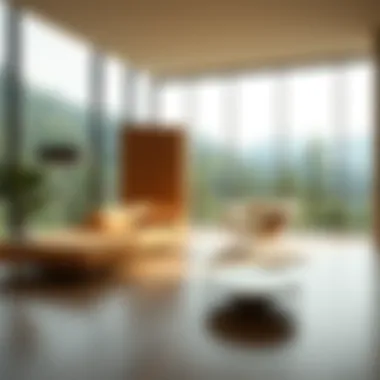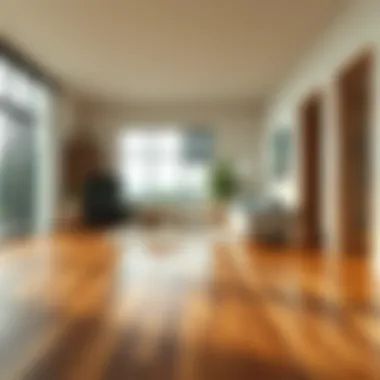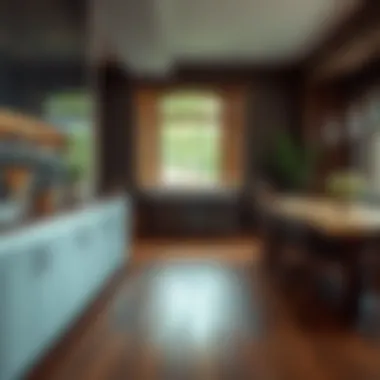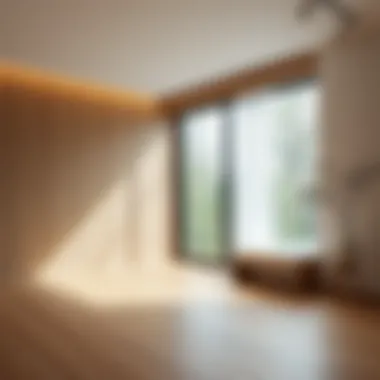The Impact of Vinegar on Hardwood Floors: Myths and Realities


Intro
When it comes to maintaining hardwood floors, opinions vary wildly. On one side, you have the advocates of natural cleaning solutions, swearing by the power of vinegar as a go-to cleaner. On the other hand, many experts warn that vinegar can cause more harm than good, particularly for specific finishes on hardwood. This article aims to sift through these conflicting views, providing a detailed look at vinegar’s true impact on hardwood floors.
The purpose of this exploration is not only to dissect existing beliefs but also to empower homeowners and maintenance professionals. Knowledge is a powerful ally in the quest for maintaining the beauty and longevity of valuable hardwood flooring. After all, floors aren’t just functional; they contribute significantly to the aesthetic of a home.
Key Points to Explore
- Chemical Properties of Vinegar: Understanding how vinegar interacts with hardwood finishes.
- Advantages and Disadvantages: Weighing the pros and cons of vinegar as a cleaning agent.
- Alternative Cleaning Methods: Offering other solutions that might be more suitable for preserving hardwood floors.
By arming yourself with the right information, you can make informed decisions about how best to care for your exquisite floors. Let’s dive deep into the realities of using vinegar and help clarify just how beneficial or detrimental it might be.
Intro to Hardwood Floors
When it comes to home design, hardwood floors often serve as a quintessential element that elevates the aesthetic of any space. For homeowners and interior design aficionados alike, understanding the significance of hardwood flooring is crucial, not just for its beauty but for the practical considerations involved in its maintenance.
One of the defining characteristics of hardwood flooring is its durability. A well-crafted hardwood floor can resist wear and tear far better than many alternatives, often lasting decades when properly maintained. This longevity makes it a wise investment for homeowners who prioritize both functionality and style. Moreover, the warmth and character of hardwood add a unique ambiance to any room, something that laminate or tile simply cannot replicate.
However, the maintenance of hardwood floors is where many find themselves at a crossroads. Misunderstandings about cleaning products abound, and this is where vinegar often takes center stage in discussions. The allure of a natural cleaning agent like vinegar can be tempting. Many swear by it for various household cleaning tasks. But how does it truly stand up against the delicate surface of hardwood?
Before delving into the impact of vinegar on hardwood floors, it’s essential to appreciate the various characteristics of hardwood itself. This includes the type of wood, its grain pattern, and even its color. These factors contribute not only to the visual appeal but also to the floor's ability to resist damage from spills and scratches. Subsequently, one must consider the different finishes available, which can dramatically alter how a hardwood floor reacts to various cleaning agents.
In the following sections, we will explore these aspects more thoroughly, providing insights that empower real estate enthusiasts and homeowners to make informed choices regarding the care of their beloved hardwood floors.
Understanding Vinegar as a Cleaning Agent
When discussing the suitability of cleaning agents for hardwood floors, vinegar often emerges as a polarizing figure. For some, it symbolizes an inexpensive, natural solution that can tackle stains and grime with ease. For others, it embodies a slippery slope toward potential damage that can mar the elegance of hardwood. Thus, understanding vinegar in the context of cleaning hardwood flooring is pivotal for homeowners and maintenance professionals alike.
Vinegar, primarily acetic acid, derives from the fermentation of ethanol. This simple composition has garnered a reputation for versatility; it's touted for its cleaning prowess, food preservation, and even as a natural remedy. Yet, despite its various applications, vinegar's interaction with hardwood floors is not as straightforward. Given the delicate nature of these surfaces, understanding both the benefits and drawbacks of vinegar is paramount.
Chemical Composition of Vinegar
The potential of vinegar as a cleaning agent stems from its chemical makeup. Mainly composed of acetic acid (typically around 5-20%), vinegar is acidic enough to break down certain types of stains, but not so acidic that it might dissolve other materials. The pH level of vinegar hovers around 2.4, a figure that highlights why it can have both cleaning and corrosive properties.
When used correctly, vinegar can effectively cut through grease and neutralize odors. However, this same acidity can spell disaster for some finishes used on hardwood floors. For instance, if your floor features a polyurethane coat, the vinegar could gradually erode the finish over repeated uses. Therefore, knowing the essence of vinegar is crucial to make informed cleaning decisions.
Antimicrobial Properties
An additional facet of vinegar that commands attention is its antimicrobial capabilities. Various studies highlight vinegar's effectiveness in killing certain bacteria and viruses, which is particularly appealing in today's hygiene-conscious climate. When applied to surfaces, vinegar has shown promise in reducing microbial contamination, which can be a boon for maintaining clean living environments.
However, it's essential to consider that vinegar is not a guaranteed disinfectant. Its efficacy can diminish against certain pathogens, and here lies a critical misstep made by many—assuming that vinegar serves as a one-size-fits-all solution. While vinegar may contribute to cleaner surfaces, relying solely on it, especially in areas prone to contamination, might not suffice.


Vinegar's Effect on Hardwood Flooring
Vinegar has long been touted as a miracle cleaning solution for various surfaces, including hardwood floors. It's important to explore its effects, as many homeowners resort to this acidic liquid believing it's the best remedy for grime and dirt. Unpacking the merits and pitfalls of vinegar on hardwood flooring helps ensure the longevity and allure of these coveted surfaces. Let's delve into the layers that compose this complicated relationship between vinegar and hardwood.
Short-term Cleaning Benefits
In the world of cleaning, vinegar is often heralded for its immediate effects, and hardwood floors can seem ripe for its application. Homeowners might bask in the satisfaction that comes after a quick sweep with a vinegar solution; it brings a temporary shine that might fool some into thinking they’ve found the secret elixir. Vinegar’s acetic acid works as a surfactant, breaking down grease and grime effectively.
Some benefits include:
- Stain Removal: It can help lift minor stains from spills or marks left by everyday traffic.
- Odor Neutralization: Vinegar also gets rid of unpleasant scents thanks to its natural antimicrobial properties. Smells might dissipate, leaving a fresh scent lingering around.
- Budget-Friendly: Compared to commercial cleaners, vinegar is relatively affordable, appealing to those (let’s face it, most) conscious of their cleaning budgets.
However, it’s wise to remember that these short-lived benefits can mask deeper issues. The surface may look good, but can vinegar be the true guardian of your hardwood floors?
Long-term Damage Potential
While the immediate results might be pleasing, the long-term effects of using vinegar on hardwood can be anything but rosy. Vinegar's acidic properties can pose serious threats to the integrity of your flooring over time. It might be tempting to use it regularly, but such choices can lead to dire consequences.
Potential damages include:
- Finish Deterioration: The lacquer or polyurethane finish protecting your hardwood is susceptible to vinegar’s acidity, which can erode this protective layer. Over time, this can expose the raw wood underneath, leading to further degradation.
- Discoloration: Prolonged exposure can result in an uneven appearance as different areas of the floor may react differently, leading to splotches or faded patches.
- Joint Damage: And let’s not overlook the joinery! Excess moisture from vinegar solutions can seep into the seams between boards, leading to warping or misalignment.
"Short-term gains can often lead to long-term pain, especially when it comes to caring for cherished hardwood floors."
Comparative Analysis of Different Finishes
When it comes to hardwood flooring, not all finishes are created equal, and vinegar's effects can vary widely based on what type of finish is applied. Understanding these nuances is crucial for informed maintenance decisions.
- Oil-Based Finishes: Generally more resistant to acidic solutions; however, excessive use of vinegar can still dull their appearance. It’s a gamble when you rely on it too often.
- Water-Based Finishes: These finishes tend to be less resilient against vinegar, leading to quicker damage if used frequently. A little splash may not seem like much, but over time, they can suffer.
- Wax Finishes: Vinegar can strip away wax finishes, necessitating frequent rewaxing to maintain the floor’s protection and glow. What a hassle that can become!
In summary, the finish on your hardwood floors plays a critical role in how vinegar interacts with the surface. Each type of finish has its unique vulnerabilities and advantages, making it imperative to tailor your cleaning methods accordingly to avoid costlier problems down the road.
Common Misconceptions about Vinegar and Hardwood Floors
When it comes to cleaning hardwood floors, vinegar often emerges as a favored household remedy, touted by many as a go-to solution. But as with most things in life, not all that glitters is gold. Understanding the common misconceptions surrounding the use of vinegar in maintaining hardwood floors can save homeowners both time and money. These myths can lead to misguided practices that may unintentionally damage the very surfaces they aim to beautify. Therefore, clarifying these misconceptions serves not only as a cautionary tale but also helps in making more informed cleaning decisions.
The Myth of Vinegar as a Universal Cleaner
One prevalent myth is that vinegar can effectively clean all surfaces, including hardwood. While vinegar possesses some cleaning properties — such as its ability to cut through grime and grease — its high acidity can cause a whirlwind of disadvantages when applied to hardwood floors. The hardwood’s finish is often sensitive to acidic substances. Over time, this can strip the protective layer of your floor, exposing the wood to moisture and other potential damages.
In fact, wood finishes vary significantly in their resistance to different cleaning agents. For instance, an oil-based finish might react adversely to vinegar, leading to dullness and discoloration. Many homeowners have learned this the hard way. After using vinegar-based solutions, they notice unsightly marks and a loss of sheen, requiring professional refinishing to restore the floor’s former glory. So, what might seem like an innocuous cleaning technique can inadvertently lead to costly repairs.


Interestingly enough, there are studies that support caution regarding vinegar's acidity as a cleaning agent on wood. If you need to use vinegar for some other surfaces in your home, consider diluting it or sticking to more suited cleaning solutions to keep your hardwood pristine.
Misunderstood Benefits of Natural Products
Another point of confusion lies in the perception of natural cleaning agents as inherently superior. Many believe that opting for natural over commercial products emphatically guarantees safety and efficacy. It’s true that natural products can be gentler on the environment and less harmful if pets and children are present. However, this doesn't mean that all natural cleaning methods are universally effective or safe for every material.
Take, for instance, the age-old wisdom of using vinegar in natural cleaning. Gardeners and eco-conscious consumers may swear by vinegar for a variety of cleaning purposes, but it’s essential to realize that flooring materials have unique characteristics. Here are notable considerations for those leaning towards natural cleaning solutions:
- Reactivity: Natural products like vinegar typically interact differently based on their chemical makeup and the nature of the flooring.
- Effectiveness: What works well on durable surfaces like tile or linoleum may falter on hardwood, especially if the finish is compromised.
- Maintenance: Over-reliance on any one product, be it natural or not, could potentially complicate the maintenance schedule designed for optimal flooring care.
By understanding these misconceptions, it's easier to see that making informed decisions regarding cleaning agents can lead to a healthier and more appealing home environment. Instead of leaning heavily on vinegar and its perceived benefits, homeowners should evaluate various cleaning methods tailored to their specific types of flooring.
"Not every natural solution is a universal answer, especially when it comes to maintaining the integrity of hardwood."
Alternatives to Vinegar for Hardwood Cleaning
When it comes to keeping hardwood floors pristine, many homeowners are on the lookout for effective cleaning solutions that won't do more harm than good. Vinegar may be popular for its natural cleaning properties, but the potential risks to hardwood finishes have led many to explore alternatives. This is important because selecting the right cleaning method not only preserves the aesthetic appeal of the floors but also enhances their longevity. Let's examine some choices that can outshine vinegar in cleaning hardwood floors.
Commercial Cleaners
Using commercial cleaners designed specifically for hardwood floors can be a game changer. These products are formulated to dissolve dirt and grime while being gentle on wooden surfaces. When choosing a commercial cleaner, consider the following:
- Look for pH-neutral formulas to avoid damaging finishes.
- Check for certifications that indicate the product is eco-friendly or safe for indoor air quality.
- Ask for recommendations from your flooring provider to find high-quality options.
Some top brands, like Bona and Murphy’s Oil Soap, offer effective cleaners that leave floors looking shiny and new without risking damage. These products can usually be conveniently found in local stores or online. With the right selection, commercial cleaners might provide that gentle touch your hardwood floors dearly need without leaving them in a sticky mess.
Natural Cleaning Solutions
If the natural route appeals to you, several effective and safe natural cleaning solutions can keep your hardwood looking great without the harshness of vinegar. Consider the following:
- Olive Oil and Lemon Juice: Mixing equal parts olive oil and lemon juice creates a gentle polish that cleans and adds shine. Just apply a small amount to a soft, lint-free cloth and buff it into the wood.
- Castile Soap: This biodegradable soap can be mixed with warm water to create a gentle cleaner. Just make sure to rinse the floor with clean water afterwards to remove any residue.
- Essential Oils: Adding drops of essential oils like lavender or tea tree oil can enhance the scent while offering some antimicrobial properties.
Natural solutions are often praised for their lack of harsh chemicals, making them a good fit for homes with children or pets. However, caution should still be exercised when using oils, as excessive amounts can create slippery surfaces.
Homemade Solutions Without Vinegar
Crafting homemade solutions free of vinegar can also be an effective route. Here are some simple recipes:
- Baking Soda Paste: Combine baking soda with a bit of water to form a paste. This can be gently scrubbed onto tough stains without scratching the surface.
- Club Soda: The carbonation in club soda can help lift dirt and debris. Pour a moderate amount onto a clean cloth and wipe the floor.
- Citrus-infused Water: Soaking citrus peels in water for a few days creates a refreshing cleaner. Just strain the mixture and use it to wipe down floors.
These homemade methods are often quite inexpensive and eco-friendly. However, they may not be as concentrated as store-bought solutions, so multiple applications might be necessary for optimal results.


In summary, while vinegar may be an easy go-to for some, exploring other cleaning options for hardwood floors can yield superior results without the risk of damage. It's necessary to be mindful of the long-term health of your floors when selecting the proper method of cleaning.
For further reading on maintaining hardwood floors, visit This Old House or check out guides on Good Housekeeping for detailed insights.
Best Practices for Maintaining Hardwood Floors
When it comes to hardwood floors, keeping them in tip-top shape is no small feat. The aesthetic appeal and longevity of your flooring significantly depend on the care it receives. Best practices are fundamental in preventing damage while maintaining that sought-after shine. Oftentimes, homeowners fall into the trap of thinking that all cleaning methods are created equal. But the reality is that proper maintenance is a bit of an art, blending techniques that fit not just the material itself, but also your lifestyle and preferences.
Regular upkeep doesn't just enhance appearance; it also contributes to the floor's lifespan. Ignoring the right procedures could mean costly repairs and replacements down the road. Consequently, understanding these best practices is crucial for anyone who cherishes their hardwood floors. Let's dive into the specifics of how to keep them looking great for years to come.
Regular Cleaning Techniques
Establishing a routine cleaning schedule is paramount. Neglecting even basic cleaning can lead to a buildup of dirt and grime that diminishes the wood's natural beauty. Here’s how to go about it:
- Dusting: Begin with a soft broom or a microfiber mop. Instead of pushing dirt around, these methods remove particles effectively. Doing this regularly, say once a week, helps maintain cleanliness and prevents scratching the surface of the hardwood.
- Mopping: When it comes to mopping, it's crucial to use the right type of cleaner. Opt for a pH-balanced wood floor cleaner, especially one free of harsh chemicals. Dampen your mop rather than soaking it; excess water can warp the wood over time. Consider using a damp microfiber mop, as it lifts dirt without the worry of liquids pooling on the surface.
"Keeping hardwood floors clean doesn't just involve aesthetics; it prolongs the life of your investment."
- Spot Cleaning: Accidents happen. For spills, promptly wipe them up using a soft cloth. For persistent spots, a little dish soap mixed in warm water often suffices. Avoid abrasive cleaning pads that could harm the finish.
- Seasonal Deep Cleaning: In addition to regular maintenance, seasonal deep cleaning serves to re-energize the floor. This may involve buffing the floors or applying a new coat of finish. Understand your floor's finish type — for instance, oil-based finishes may require specific care compared to water-based ones.
Preventive Measures Against Damage
Cleaning is one half of the equation; prevention is the other, and often the unsung hero of hardwood maintenance. Taking proactive measures helps avert potential hazards that could lead to unsightly scratches, dents, or discoloration.
- Furniture Pads: Placing felt pads under furniture legs mitigates the risk of scratches when moving items. It’s a small investment that pays off in maintaining the polished look of your hardwood.
- Regular Inspections: Make it a habit to closely examine your floors for any signs of wear and tear. This includes checking for scratches, water damage, or changes in the finish. Early detection can lead to quicker remedies.
- Humidity Control: Wood naturally expands and contracts, which can wreak havoc if left unchecked. Maintaining a stable humidity level, ideally between 30-50%, can help keep your hardwood from becoming warped. Use a humidifier or dehumidifier as needed, especially in climates with extreme changes in moisture.
- Area Rugs: Strategically placed area rugs provide additional protection, particularly in high-traffic zones. Not only do they serve a functional purpose, but they can also enhance the aesthetic appeal of the room. Just remember to avoid rubber-backed rugs, which can trap moisture and damage the wood.
- Shoes Off Policy: Encourage a no-shoes rule inside your home. This simple habit can dramatically reduce dirt and prevent potential scratches from shoe soles.
By following these best practices, homeowners not only cultivate an arrangement that highlights the beauty of their hardwood floors but also experience the rich satisfaction that comes with preserving such an investment.
Culmination: Balancing Benefits and Risks
In the realm of maintaining hardwood floors, the conversation around cleaning methods can often spiral into a maze of conflicting advice. The intersection of benefits and risks becomes a prominent focus when discussing the use of vinegar as a cleaning agent. While vinegar does possess certain cleaning properties, it’s crucial to weigh these against the potential long-term consequences it might inflict on your coveted hardwood surfaces.
One of the key considerations is understanding the nature of your hardwood’s finish. Not all finishes are created equal, and the aggressive acidity of vinegar can wear down specific coatings over time. For instance, if your floors have a polyurethane finish, using vinegar might not pose as significant a threat as it would on waxed finishes. It's this nuanced approach that underpins the need for tailored cleaning solutions.
Evaluating Your Cleaning Choices
When examining your options for floor maintenance, it's advisable to take a step back and critically assess your cleaning habits. Ask yourself questions like:
- What type of finish does my hardwood floor have?
- Have I noticed any discoloration or dullness after using vinegar?
- Are there gentler alternatives that can achieve the same cleaning results?
Vinegar may offer quick cleaning benefits, but if it is hurting your floor's appearance or integrity, then it’s not worth that shiny sheen. Instead of jumping on the vinegar bandwagon, consider testing milder solutions or commercially formulated hardwood cleaners designed for your specific finish. While natural products might seem appealing, they aren't always the safest bet for cherished hardwood.
Advocating for Informed Maintenance Practices
To truly advocate for the health of your hardwood floors, making informed choices becomes paramount. Begin by researching cleaning practices tailored to your specific flooring type. Start with basic preventative maintenance:
- Regularly sweep or vacuum to remove debris.
- Use damp cloths instead of soaking the floors with water or acidic cleaners.
- Keep humidity levels balanced in your home to prevent warping.
Moreover, consider consulting flooring experts or resources that can offer personalized guidance. Engaging with professionals can provide insights that many DIY articles might overlook. Websites like This Old House or Bob Vila often contain valuable content that speaks directly to maintaining the beauty of hardwood floors. Always know the finish, your cleaning agents, and stay updated on best practices. Knowledge is power; in this context, it is also the key to maintaining your floors’ allure without the risk of damaging them.



